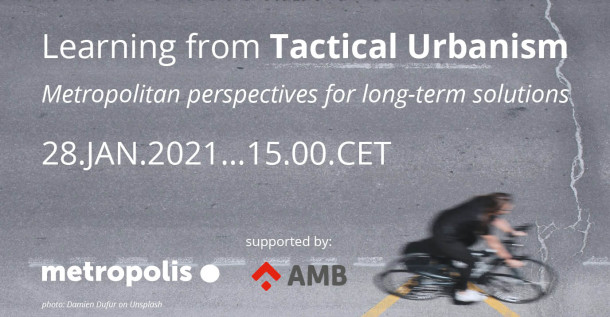INTERNATIONAL
CALENDAR
CALENDAR

Learning from tactical urbanism: Metropolitan perspectives for long-term solutions
Introduction
The COVID-19 pandemic is leading urban communities to approach public spaces differently. The neighbourhood scale of urban life has become central for all citizens, who claim for new ways of public space appropriation. On the other hand, local governments have been searching for low-cost and rapid solutions to meet the needs of an adapting urban community. This is visible, for example, in the creation of new spaces for pedestrians and bicycles implemented by many local authorities, especially in Europe, North and South America.
It is clear that social distancing is not the only matter that the current transformative urban design has to address. The emergency situation has highlighted many issues that affect urban areas and communities and that, if faced, could improve the quality of life of inhabitants. From the accessibility to and efficiency of public services to the safety of urban spaces; from the identification of administrative boundaries to the collaboration among different urban stakeholders, COVID-19 made visible that not only streets might need to be re-designed, but that a more inclusive, flexible, safe and healthy metropolitan governance system needs to be implemented.
In this scenario, many tactical urbanism temporary solutions have been implemented at the local scale to meet people’s needs quickly and efficiently. As in other historical moments when cities have been under extreme stress, tactical urbanism has gained a central role in the recovery process and in the rehabilitation of urban life. This approach managed to rapidly provide citizens with more inclusive, safe and healthy spaces with a reduced cost.
Thanks to the possibility to be implemented with a very low budget, tactical urbanism’s projects have gained success among both institutions and the population. Being conceived in a short-term perspective, and related to very specific and undiscussed issues, they have managed to raise public financing quickly.
In Metropolis we are convinced that local and regional governments should take the pandemic as a chance to learn about the fragilities of their governance models and rethink the future of their cities. In particular, tactical urbanism can provide affordable approaches to change public space efficiently, including the voices of urban communities and implementing rapid solutions that encourage citizens to appropriate urban spaces.
However, in the long-term perspective, it is fundamental to recognise the complexity of urban realities, that make up metropolitan spaces where the coordination of different actors becomes essential to build sustainable policies. If urban transformations at the metropolitan scale are thought to be complex and expensive, tactical urbanism can provide insights to build better strategies, studying new multi-stakeholders financial models.
Panels
- Tactical urbanism: socio-economic lessons from the pandemic
- The metropolitan scale of tactical urbanism: opportunities and stakeholders
- Envisaging tactical urbanism in the long term
Participants
- Sílvia Casorrán, Head of Bicycle Projects at the Sustainable Mobility Services Directorate, Metropolitan Area of Barcelona
- Noemí Martínez, Head of Projects and Urban Design Office at the Public Space Services Directorate, Metropolitan Area of Barcelona
- Xavier Nogués, Head of the Mobility Projects Service at the Public Space Services Directorate, Metropolitan Area of Barcelona
- Tony Van Nuffelen, International Coordinator, Urban Brussels
- Nadya Rangel, Secretary of Habitat, Alcaldía de Bogotá
- Peter Fianu, Architect, City of Montréal
- Karla Miranda, Deputy Director of Planning and Research, COAMSS/OPAMSS
- Federico De Giuli, Architect and scientific director of the Italian University for Design IAAD, Metropolitan City of Turin
Moderator: Octavi de la Varga, Metropolis Secretary General
Specifications
Developed in the format of a round table, where participants can share ideas and learn from each other, this online session will be an exclusive moment of discussion among the invited members of Metropolis. It will take place on the 28th January, at 3.00 pm (CET), and will have simultaneous interpretation in English, French and Spanish.
If you want further information on this session, please don't hesitate to contact Ms. Laura Valdés from the Metropolis Secretariat General staff: lvaldes@metropolis.org.
Registration
This is an exclusive webinar for representatives from Metropolis members
Please register here to attend the webinar

